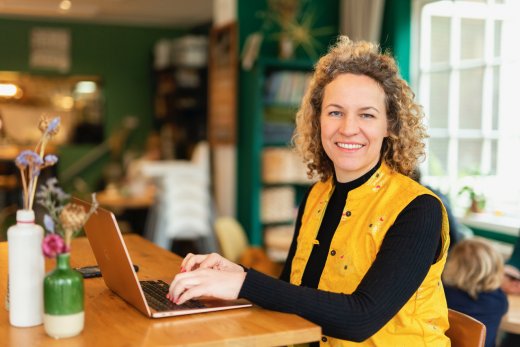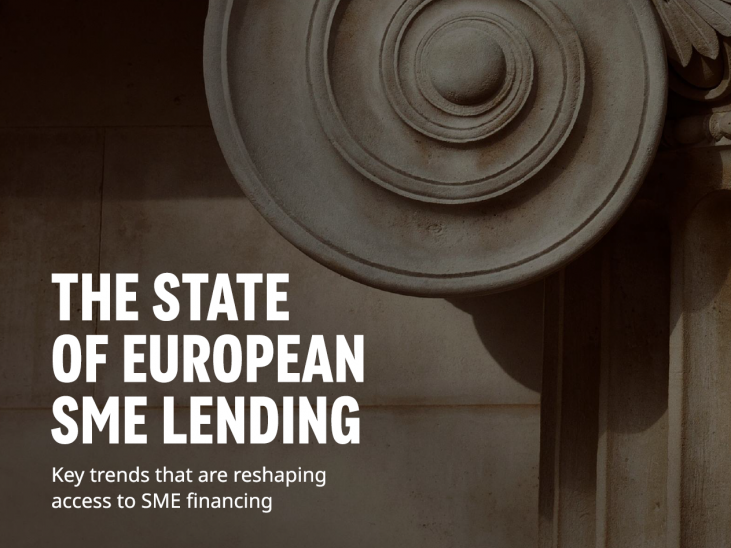5 Questions about Digital Sustainability to… Wendy Hoenkamp

Many organisations nowadays pride themselves on their sustainability efforts and are keen to position themselves as a sustainable choice. But when the social media channels are dominated by the BigTech platforms, how can organisations truly practice what they preach in their online marketing strategy? According to Wendy Hoenkamp, an independent Dutch marketing communications consultant and self-confessed ‘marketer with a moral compass’, there is a digitally sustainable alternative.
“Extending your sustainability efforts to digital marketing gives you a competitive edge”
What kick-started your journey into digitally sustainable marketing?
My parents raised me to have a practical yet planet-minded view of the world. They were scientists but also vegetarians, for example, and in the 1990s we were the first family in the whole neighbourhood to install solar panels. Since then, sustainability has always been a common thread for me: from my master’s degree in new media studies in 2007 – which just happened to be the year of Facebook’s launch – until today.
When I graduated, I decided to be guided by my moral compass, and ever since then I’ve consciously chosen to work only with non-profits or companies that have sustainability, fair trade or some other social objective at the core of their operations. This resulted in various marketing communications projects, including one for Dutch consumer rights organisation Consumentenbond as campaign manager for its privacy-violation lawsuit against Meta/Facebook.
But at the very same time, I was actually spending my other clients’ marketing budgets with Facebook and similar platforms in an attempt to reach as wide an audience as possible for them. That’s when the lightbulb moment occurred for me: on the one hand, many organisations are trying to make the world a better place, while on the other, they are financially supporting companies that are often completely at odds with their visions and beliefs. So I decided to look for a solution to this conflict of interests for my clients.
What is the current level of awareness of digital sustainability among marketing professionals, and how is this changing?
Although today’s marketing professionals are generally very aware of their organisation’s ESG-related achievements in general – reducing the carbon footprint in terms of energy consumption, transport and packaging, for example, or protecting workers’ rights – it still surprises me how little they think about the impact of their own roles in this context. For example, if they hire an agency, they rarely ask about that agency’s ESG performance: topics like sustainable procurement or carbon-neutral hosting, for example. Ideally, such questions should automatically form part of an RFP nowadays. And these are just the basics from a ‘planet’ perspective. Digital sustainability, or what I’d describe as ‘ethical online marketing’, requires them to go a step further even.
Having said that, I’ve found that it has become easier to have these kinds of conversations since late 2022. Why? That’s when Elon Musk bought Twitter! As standards rapidly declined on that platform, people quickly became more aware of its negative aspects, such as the addictiveness, sensationalism, hateful atmosphere and encouragement of polarisation. Numerous people quit the platform and went in search of an alternative, which led to an upswing in the popularity of Mastodon. Nevertheless, most businesses and organisations are still communicating on the BigTech platforms. Apart from a few exceptions, marketing professionals don’t yet seem to be questioning whether those platforms actually fit with the mission and vision of their organisation.
What can organisations do to improve the digital sustainability of their marketing communications?
Sustainability-related marketing communication can be broken down into three parts. It starts with ‘What can you say? In other words, how sustainable is the product or service you’re marketing? This is followed by ‘What do you say?’. This is about defining your actual message. The third decision is ‘Where do you want to say it?’ – and this is the aspect that’s not yet receiving enough attention. Organisations need to realise that they can – and should – take a holistic approach and make a conscious choice about all three of these aspects. But I’m not suggesting we have to stop using social media altogether. It’s about thinking about which platforms are best reconciled with your organisation’s social values.
I place the various platforms on a ‘sliding scale of ethics’. I see TikTok as the worst offender, based on concerns about data privacy due to its links to the Chinese regime, plus there also seems to be evidence of ‘shadow-banning’ of disadvantaged groups. Facebook and Instagram are somewhere in the middle, and LinkedIn is currently one of the better options, although still not perfect. Even the perceived ‘better’ alternatives for X, such as BlueSky and Threads, deserve closer examination. For example, BlueSky has venture capitalist backing, and Threads is primarily driven by profit goals rather than ethics. That’s why I’m a big fan of Mastodon, which truly is an open, nonprofit, “citizens’ social media network”. As a federation of servers – each with different rules and priorities – it enables you to select one that closely aligns with your own values. And if you’re a larger organisation with sufficient IT capabilities, you can even use its open-source technology to create your own sever. Plus Mastodon supports the principle of ‘self-determination’ by allowing users to take all their followers with them if they decide to move to a different server.
If an organisation decides to start communicating on this platform, it doesn’t have to be a drastic step. For instances, you could decide to replace just one BigTech platform with it initially, to give it a try. This also enables you to build up your followers on Mastodon by promoting your new profile in the bio’s of your existing social media accounts. And then monitor the metrics for a few months, and fine-tune your goals and strategy as you gain new insights.
Why are organisations hesitant about making the change, and what are the benefits if they do?
Mastodon still has a bit of an image problem as an obscure or ‘niche’ platform, so the main hesitation is the fear of losing their existing followers. While it can’t compete with the huge scale of X or Facebook, for instance, you might be surprised to see how many people – and organisations similar to yours – are already active there. After all, the number of Mastodon users has grown from 3.5 million to over 8 million since late 2022 – although that’s still only a tiny figure compared to the billions of users on Facebook, of course.
Another concern is about the potential loss of traffic to the organisation’s own website. Interestingly however, when the USA’s National Public Radio took the plunge and left Twitter, it found that traffic to its own website dropped by only a single percentage point. This is because BigTechs like to keep users on their own platforms for as long as possible, so clickable links often open on the platform rather than on your own website. In other words, BigTech platforms aren’t usually a great source of organic traffic, so the negative impact of leaving them can be smaller than expected.
Moreover, in the past decade we’ve seen a shift in the basic principles of reach on social media. Whereas a brand used to have to be creative or unique or lovable or good to get noticed online, today’s advertising-based BigTech business models mean that it’s now just a matter of money; you can get as much reach as you’re willing to pay for. But on Mastodon, it’s like stepping back in time; you can’t buy reach. However, with a ‘good’ sustainability-related message, you have a distinct advantage. In fact, there are many examples of organisations on Mastodon who have seen tremendous increases in their engagement ratio. Their reach is much lower, of course, but the quality of that reach is much better.
But let’s be honest, the benefits of ethical marketing are difficult to quantify in short-term economic gains. Instead, it’s about the long-term benefits of choosing a way of working that aligns with your values. Think of the reputational benefits that come from being a trustworthy brand that is leading by example. This in particular is becoming increasingly important as Western consumers – and especially the younger generations – are making conscious, sustainability-driven choices. In fact, this often extends to their choice of employer, so taking an ethical approach can even help you to attract and retain more motivated employees, leading to higher performance. I’m convinced we’ve almost reached a tipping point. Staying true to your values and extending your sustainability efforts to your digital marketing activities is a relatively easy way for you to benefit from an early-mover advantage and get ahead of the competition, as a building block for long-term success.
Can you share any examples of how digitally sustainable marketing has been put into practice, and what have been the results?
I’ve recently supported the Dutch Humanistisch Verbond (Humanist Association) in transitioning from X to Mastodon because it is much more closely in line with the organisation’s core principles: a humane society based on personal freedoms and diversity, self-determination and empowerment. The biggest surprise was the high level of engagement achieved with some posts, in terms of reposts, likes and comments. Whereas on other platforms we would typically see around 2%, we were suddenly achieving engagement levels of 50 or 60%! Additionally, the quality of the comments is much higher than on any other medium I know. This has led me to conclude that higher-quality content works particularly well on Mastodon; it’s less about sensationalism, and more about meaningful, nuanced and balanced messaging.
At the end of the day, the users themselves hold the power over whether a social media platform is a success or not; in that sense, we get the social media landscape that we ‘deserve’. And I believe we all deserve to at least have an alternative to today’s dominant BigTech platforms. That’s why I hope to encourage marketing professionals within organisations with any kind of sustainability message to give Mastodon a try, so that we can create a platform for digitally sustainable marketing communications together.



